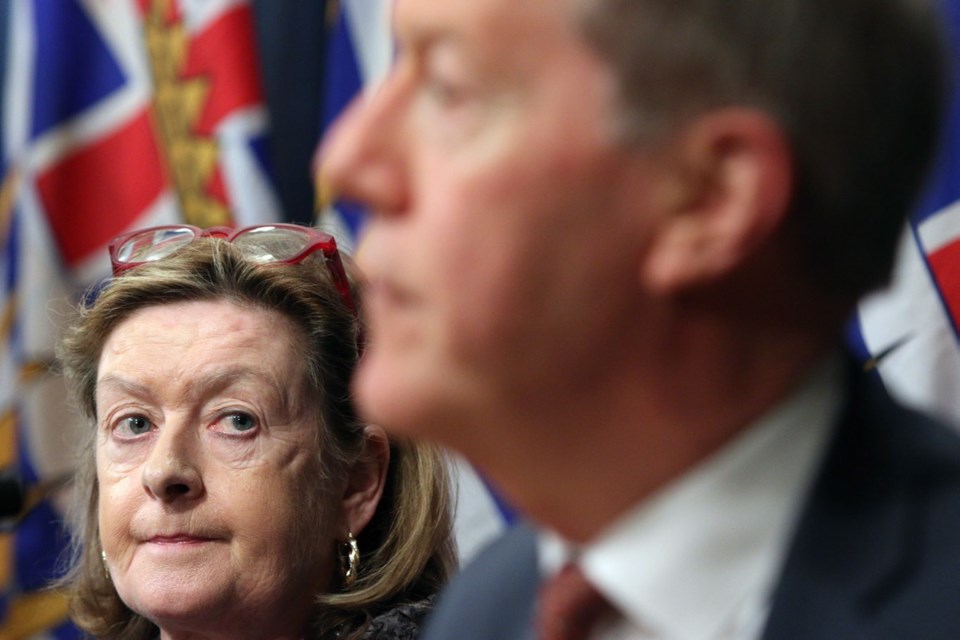 The solution to rampant money laundering in B.C. is to bury the bad guys in forms, disclosure requirements and paperwork.
The solution to rampant money laundering in B.C. is to bury the bad guys in forms, disclosure requirements and paperwork.
That includes the lawyers and all the other sectors who inadvertently or otherwise get involved in shady real-estate deals.
That’s the implicit conclusion in two major probes released Thursday. They peg the amount of money laundered in B.C. last year at $7.4 billion, $5.3 billion of it via real estate.
That’s five per cent of the real-estate market, and it’s blamed for increasing prices by five per cent.
The mystery figures who are gaming the B.C. real-estate market with dirty money would face new reporting requirements at new steps in the transaction process, if recommendations are followed. That includes financing, as well.
Even stringent requirements won’t end money laundering. If they’re onerous enough, it could curb the practice.
But the main goal of the recommended bureaucratic onslaught is more to bring the problem into sharper focus.
It’s a measure of how far behind the play B.C. is that it will take such a major effort to further identify the problem, let alone tackle it.
The numbers coming out of the first-of-their-kind reports released Thursday are striking. Not just for how large they are, but how vague they are.
The report stresses that the inherent secrecy and the lack of data mean there is no definitive way to measure money laundering.
The figures are just educated guesses. They’re based on economic modelling and data analysis, several steps removed from the actual transactions. The authors say the estimates are made “cautiously,” and are likely at the low end.
It’s clear the federal and provincial governments have just the faintest inkling of what’s going on.
Officials have well-grounded suspicions that organized crime and money laundering are entrenched in the B.C. economy. But confirming those hunches and acting on them will take a massive sustained joint effort by two governments.
If that is accomplished, which is far from certain, it could make a difference. But the downside is that the new requirements apply to everyone, not just the bad guys. And everyone will obviously have to pay for it.
The provincial regime has been tightened up slightly since money laundering became an issue. Another upgrade is currently before the legislature — a law to require firmer identification of who owns property.
An expert panel chaired by lawyer Maureen Maloney, which conducted one of the probes, said the lack of provincial regulations and weak federal law contribute to Canada’s ineffectiveness on money laundering. The system tracks property purchases more for tax purposes than with money laundering in mind.
The panel urges that that mandate be included and extended to mortgage lenders and money-service businesses. Lawyers, who play a vital role, won an exemption in court from the federal duty to report large transactions years ago.
Proceeds-of-crime expert Peter German, who wrote the second report released Thursday, on money laundering in real estate, called lawyers the “black hole” of real estate and of money movement.
One of the new controls urged is the use of “unexplained wealth orders.” B.C.’s civil forfeiture office is used to seize property presumed to have been obtained from proceeds of crime, even if no convictions are lodged. Since it avoids the need for convictions, it’s easier and increasingly used.
The panel recommends an increase in that office’s power. It would no longer need suspicion of criminality; it could “confiscate property where there is no evident legitimate source of funds.”
Just So You Know: The same day the reports came out, B.C. Lottery Corp. posted a notice on the bid site for provincial contracts.
It’s looking for a company to design an “Anti-Money Laundering Solution.” Great idea, 10 years late.



